#that was a great analysis
Explore tagged Tumblr posts
Text
Shipping is fun and all but I swear every single time someone makes a comment, whether as a joke or in a legitimate analysis, about there being "no other explanation" for a pair's interactions, I lose just a bit more of my sanity
Like, no, you guys don't get it. Romance is not about the Amount of devotion, it's about the COLOR. the FLAVOR of it all. a character can be just as devoted to their platonic friend as they are to their romantic partner, and they don't love either of them more, just differently.
But because the majority of people still have it stuck in their minds that romance exists on the highest tier of love, I'm stuck seeing endless takes that boil down to "these two care about each other too much for it to NOT be romantic" as if that's the core determining factor to how literally any of this works
In conclusion: stop telling me that I don't understand the story if I don't interpret the leads as romantic, I am TIRED
#analysis#meta#miscellaneous#fandom#shipping#media discussion#amatonormativity#lgbtq#I feel like tagging any of the fandoms I was thinking of when writing this would be a little mean-spirited potentially#Disclaimer: no one has actually been telling me personally that I don't understand any story in particular#It's just that the way people tend to phrase their analyses feels unnecessarily targeted at the reader and that's just. not great#even if I agree with every other point they make
24K notes
·
View notes
Text
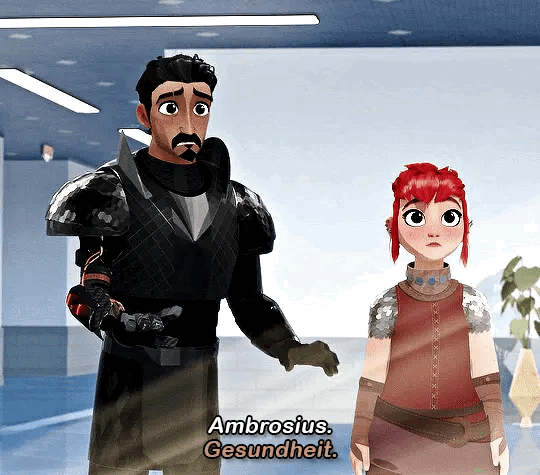
Rolling on the floor at the concept that Ambrosius is canonically a weird ass name, like in-universe it’s not a normal fucking name
Ambrosius Goldenloin
HIS NAME IS IMMORTAL BIGDICK
#i can’t with him#nd stevenson#you did great#ambrosius goldenloin#immortal bigdick#nimona#nimon fanart#nimona ambrosius#nimona movie#nimona analysis#nimona comic#nimona 2023#nimona spoilers#nimona ballister#ambrosius
22K notes
·
View notes
Text

It's crazy how Dungeon Meshi's manga can feel more cinematic and emotional than the anime to me, even when they're practically the same. Compared to the anime, this moment is such a heartbreaking gut-drop. The way Kui uses negative space and flat compositions to create a sense of horrific stillness is so key.
The way the text (Senshi's monologue) is sequestered to an empty corner of a panel or huddled away from the edge of its text box is not only a great way of showing Senshi's headspace (fearful, isolated, dissociating), but creates a visual representation of pause, as if you hold your breathe after each line. The first panel puts us directly in Senshi's perspective too (compared to in the anime, which puts us as an outside observer over Senshi's shoulder). The detail of the door and bricks so effectively implies that he stared at it for so long, waiting and hoping, that its image is burned in his memory. The wood grain, the brick arch, the number of rivets. The lack of dialogue in the second panel shows a moment of realization too –– "he's dead" (also a great example of the Kuleshov effect). And it's that pause that creates a beat and sets a great rhythm to his headspace, like a music rest: "He never came back." (oh god.) "I'm all alone." Finally, the third panel's negative space, cropping Senshi, shows how truly alone he feels. Without his family, the world ceases to exists. Under shock, he traps himself in a 1-foot radius, too scared to even perceive a world outside its boundaries; a world that can hurt him, kill him, make him disappear with it. There is only his body, the stone beneath his feet and against his back, his thoughts, and that awful bowl of soup.
Even though they're a series of flat images, there's an implicit reading of silence in Senshi's realization and horror. Kui influences your experience to slow down and take your time.
Compare this to the anime, which fills every shot with dialogue. The pacing is fast; we never get to sit in silence like we do with the manga. The horizontal frame allowed the boarders to add Senshi, turning the composition into an over-the-shoulder shot, which takes us out of Senshi's POV. They also added a zoom-out in shot one, which adds unnecessary energy to a very somber scene. The tightening on Senshi as a close-up reaction shot also dulls the moment. In the original panel, Senshi stares ahead at the empty space to his left as a shadow surrounds his mind. It not only shows how Senshi's senses are dulling and his world is shrinking (setting up panel three), but shows how terrified Senshi is of what's in front of him, how the air itself becomes pitch black and opaque, how Senshi is surrendering himself to fear. The pacing is understandable and necessary; this episode packed a lot of story content together. It's just a shame because it really (imo) deflated one of the most nauseating moments in Dungeon Meshi.
#dungeon meshi#senshi#analysis#personal#long post#not art#because comics are inherently more abstract and rule-breaky the format thrives off show don't tell#i think trigger is doing a great job overall but they missed the mark on this scene#for me cinematic storytelling will prioritize rhythm; tension; and silence over plot. that's why the manga feels more “cinematic”#if you've been enjoying the anime i cannot recommend also reading the manga enough. it's a completely different experience with much more#subtext and emotion to draw from
4K notes
·
View notes
Text
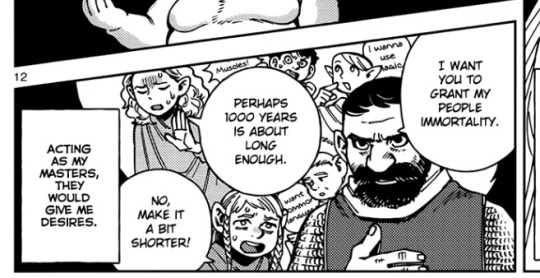
Not sure how widely recognized this is but it’s fucking wild to me that miss kui just quietly snuck in the fact that most (if not all) of the differences between races only exist because of wishes they made to the Winged Lion.
Dwarves being strong? Lion wish. Elves being good at magic? Lion wish. All lifespan differences???? Lion wish, babey!
Not that the elves superiority shtick isn’t already BS, but it’s even funnier with the context that the only difference between them and humans is that, thousands of years ago, their leaders made a greedier wish to the demon that wanted to eat them.
#dungeon meshi#delicious in dungeon#dunmeshi analysis#truly I think about this all the time it’s wild#something great here too in like not only that it’s all bs but that so much of the bs is due to what advantages are inherited#from privilege. elves aren’t special there are just 500 year old nepo babies#dungeon meshi spoilers
5K notes
·
View notes
Text
Alastor despises Susan, and dislikes Vaggie.

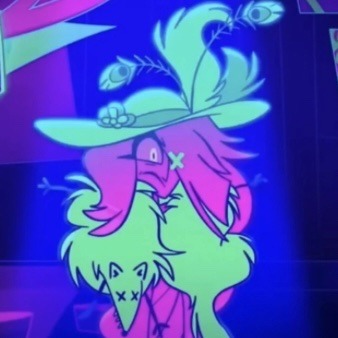
So, he dresses Vaggie like Susan (but fancy) as a very discreet insult during his reprise sequence in the pilot. I just noticed this.
#hazbin hotel#alastor#hazbin alastor#hazbin hotel memes#analysis#deer troll daddy#hazbin hotel susan#susan#hazbin vaggie#vaggie#nice digs#hazbin hotel pilot#Alastor’s neon color palettes are fun#ugh susan#vaggie is great
4K notes
·
View notes
Text
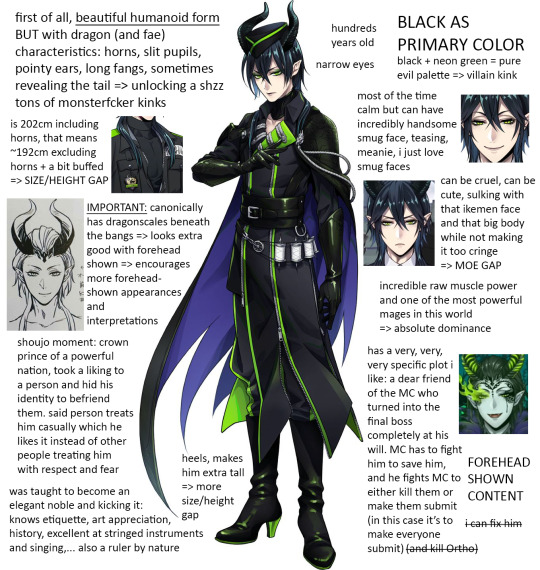
reposting this texty picture since i lost the older post. it's a summary of how most of the tropes i like coincidentally fit into malleus perfectly, and the ones not being included in canons are his common headcanons.
i'm going mental rn
#twisted wonderland#malleus draconia#yapping#twst#disney twisted wonderland#twst malleus#twst analysis#i didn't learn the word “yume” before making this picture so i used an old word “shoujo”#disney twst#twst wonderland#his common headcanons are clingy-protective-yandere which i also like#what a great character!
1K notes
·
View notes
Text
“I hate that I fell in love with you.”
But she didn’t. She found him lying on the beach, and he was real, and he was there, and she wasn’t alone anymore, and she responded with such desperation and carelessness that she hurt him and drove him away.
She’d been alone so long that she mistook the relief of not being alone for love. She felt connection for a moment - and through her own actions, she messed it up.
(Even if she hadn’t, he still would have left her. She still would have ended up alone.)
“Why in the world won’t you love me too?”
Because you can’t control who does or doesn’t love you - but how would Calypso know that? She doesn’t know what love is. Chances are, no one will ever love her again.
#ok a character can do terrible things and still be a great character#calypso is a good character#the story challenges you with this character#it makes you think about what does and doesn’t make a character unsympathetic or irredeemable#and I love it#epic the musical#epic the musical spoilers#epic the vengeance saga#epic calypso#epic the musical analysis#epic odysseus#odysseus#calypso#im not sorry for loving you#madbard rambles#I’m not defending her#but I want to understand her
459 notes
·
View notes
Text


x
#i don’t agree with everything in this article ftr—-#like this is fast paced analysis that aims to be witty first it’s nothing super insightful#acolyte and sequel trilogy analysis in particular a bit scattered#but this line . kinda great synopsis of why we’re cooked#star wars
427 notes
·
View notes
Text
in the nicest and most non-confrontational way possible. i feel like some of you think that anything that isn't directly openly spelled out for you within a story is "missed potential" or "unexplored." like. sometimes there are implied narratives. sometimes the point is that you as the reader are supposed to think and draw your own conclusions and participate in the story. the writers not directly spelling every little detail out for you doesn't mean that the story is poorly written or missed its own plot details somehow. PLEASE.
#if i get one more comment referring to zelda's draconification as wasted potential im going to lose it for real#that's not unexplored potential that is THE ENTIRE STORY. JUST BECAUSE THEY DONT BEAT YOU OVER THE HEAD WITH IT DOESNT MEAN ITS NOT THERE#i get this all the time with just like. link's trauma in general too.#like people will ask me 'do you think they should explore link's trauma more' and im like. they do#that's what the games are about. it's all there. they just don't directly state that that's what they're doing because theyre expecting you#as a reader to ENGAGE WITH THE DAMN TEXT BEYOND SURFACE LEVEL. UGHHHHHHH#WHATEVER. whatever#like i feel like some of you would read the great gatsby and be like#'there was a lot of missed potential to talk about the failure of the american dream' GIRL IT'S RIGHT THERE. JUST THINK A LITTLE#personal#and yeah obviously its not that deep its a video game but like. i am not making shit up when i write my comics and analysis.#I AM ENGAGING WITH THE TEXT. AS IS GENERALLY EXPECTED OF A READER#ugh ok whatever. im done now sorry
669 notes
·
View notes
Text
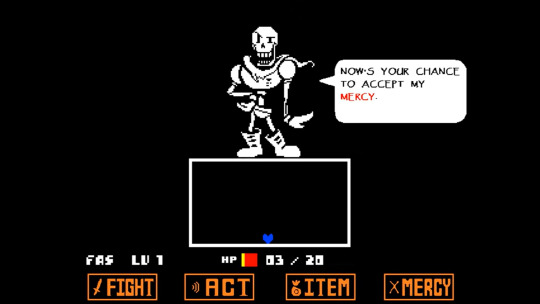
Any analysis of how Undertale deals with Pacifism and how it tries to guide the Player towards it has to take a deep look at Papyrus. Because Papyrus is the one character in the game who will never kill, the one actual ‘True Pacifist’ in the game’s main cast.
I mean, the Player can be an even bigger Pacifist. Papyrus does still FIGHT, and the Player can get through an entire run without draining a single sliver of HP. But… they can also be the world’s biggest murderbastard and literally stab reality to death.
Toriel would very much like to not kill, but she is also fully capable of doing so.

Same with Asgore, but he has a lot more actual blood on his hands. Undyne and Mettaton are both fully 100% willing to kill to accomplish their goals. Sans is non-violent in most runs because he’s too lazy and depressed to do anything, and when he is motivated into actions - it is in the form of a FIGHT to the death. Alphys… the timeline is a bit fuzzy cause both she and Mettaton love lying so much, but it seems like she did sincerely add deadly weapons to Mettaton cause killing humans would make him more 'useful' and then had second thoughts once she developed a parasocial relationship with the Human Child and THEN she and Mettaton started hatching their little play-acting plan. I think??
With Papyrus there is NONE of this ambiguity, we know for sure - no matter what timeline or what may come - The Great Papyrus will always choose MERCY.
And the interesting thing about that is on a Meta-Sense, Papyrus is a very rare example of the game giving MERCY towards the Player.
Because the game starts out being really obtuse with the Sparing mechanic and how it works. If you want to be a Pacifist in Undertale from the get-go, you’re gonna have to work for it. You're gonna have to figure it out on your own and commit to it and believe that it's possible. It's basically a test of your own belief in non-violence and your moral integrity. Then, the RUINS end with the Toriel boss battle - in a way, that’s probably the hardest Sparing puzzle in the whole game. And it’s very very easy to accidentally kill her. (I’d almost say that’s the intention of the battle, to try to goad the Player into Resetting so they can see how the game remembers across RESETs)

And then we have Papyrus, and it’s not just that his ‘Sparing Puzzle’ is something as simple as outlasting him and letting him run out of dialogue - and it’s not just that he’s the only boss that will just give up and let you continue if you lose to him enough times. it’s also that, just as Papyrus is the only boss incapable of accidentally killing the Player - he’s also the only boss that the player is incapable of accidentally killing.
(Okay, fine, to be pedantic, there’s also Asgore)

I mean, the Player can certainly kill him if they want to - but draining Papyrus’s HP just makes him skip through his battle dialogue right to the end of it. It’s designed in such a way that, no matter what Route you're on and no matter what approach you take with Papyrus - you will always end up on this screen.

Unlike basically any other Monster in this game, including the major boss battle just before him - you can’t kill Papyrus accidently. You can't kill him without also having Sparing him as an option. The game kinda treats killing Papyrus as one of the Worst Things You Can Do because killing Papyrus will always be a deliberate, considered action done to a person who will not kill you and who has stopped wanting to FIGHT and has extended a hand of Mercy. With the game clearly communicating what you need to do to Spare him at that moment.

And that means that - even if you killed before, even if you don’t have the patience of a True Pacifist, even if you spent all this time in the game without even trying to engage with the Sparing mechanic… as long as you don’t want to be a Huge Rat Bastard, the game is basically gifting you with the very very easy option to not be. Being a Pacifist in Undertale is usually a challenge - a puzzle to be solved, a test to pass. But as long as you aren’t intentionally trying to be the Worst Person - the game is basically giving you Papyrus.
If you accept his Mercy, you are accepting the game’s Mercy. That sort of benefit-of-the-doubt assumption that maybe all of the LOVE you might have accumulated so far was all due to honest mistakes or panic or an attempt in self-defense. That you still deserve this one chance to prove that you are not intentionally, maliciously cruel - or at least not like the Worst Person in the World. Even if you did kill before, you still deserve at least one friend.
And Sparing Papyrus leads you to his wonderful Hangout/Dating Sequence and to his Phone Calls and they all add so much wholesome charm to the Undertale experience and no matter what happens Papyrus will always think the best of the Player and he will always trust them and it also makes Sans also kinda your buddy by default. And more than just adding a little bit of wholesome charm into even the more LOVE-filled Playthroughs, I think this is meant to try and incentivize these players into trying out the Mercy mechanic a bit more.
Whatever it’s, like, for future playthroughs or Resetting the game right there to try a True Pacifist Run right there and then or just trying to be a little kinder for the rest of this current playthrough - especially since there’s an emphasis about the close friendship Papyrus has with the upcoming boss Undyne, and to a lesser extent with his idol and next-next boss battle Mettaton. It’s like “well, if you didn’t figure out how to spare before, this is how you do it? And isn’t it nice to have a friend? Isn’t it nice to not have to kill this lovable skeleton man? You should do this more often wink wink nudge nudge!”
And it’s like… all of Papyrus’ loved ones care about him so much but they also look down on his pacifism. They see his inability to kill and desire to make friends as simple naivete and that’s why all tend to hide the truth from him all the time. About what will happen to the Human he will capture, about what his new Human friend might’ve done, about the fact that they view him as so naïve.
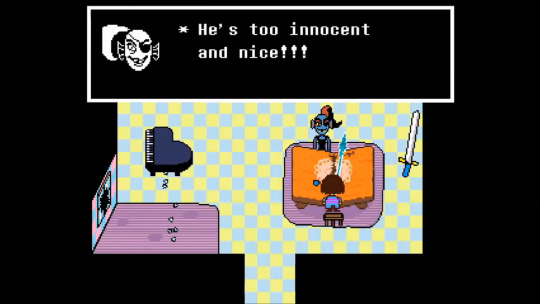
They admire it on some level, that’s why they want to protect it, but they also see it as a weakness which is why they want to protect it by lying to him all the time. But, you know, Undyne says that if Papyrus goes into battle he’ll be ‘ripped into little smiling shreds’ and that is certainly what happens every time a Player chooses to refuse Papyrus’ Mercy and the game’s Mercy and press that FIGHT button…

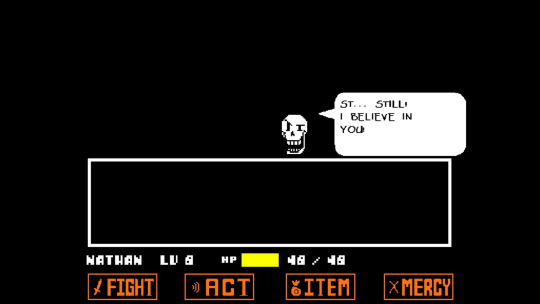
But have you thought about all the times that doesn’t happen? All the careless or violent players who were offered that skeletal hand of friendship, accepted it and then carried that offered kindness forward for the rest of the game? All the players motivated to do good for the sake of their buddy Papyrus? All the Murder Routes stopped because the player just didn’t have it in them to kill someone who believes in them so earnestly?
Like, no, it’s not a surefire thing - especially since Papyrus has so much less narrative power than the Actual Unkillable Time God that is the Player. But it happened, and it happened many many times to many players. Papyrus offered Mercy, the game offered Mercy. And much like Frisk’s Pacifism, it comes from a place of seeing the honest goodness in your ‘enemy’ and can inspire them to become a better person - this little sparkle of goodness being passed forwards.
And I think that’s beautiful, even if it didn’t happen in every timeline. Any potential future where Papyrus’ kindness can have such an effect on the Player and thus the entire trajectory of the Underground validates his kindness and pacifism on some level - even if there are also always the potential worlds that it backfires completely.
And there’s also one other way in which the Great Papyrus Proves Pacifism Pays. One that is a bit more practical, perhaps. And one that Papyrus himself is not even aware of.
Papyrus’ boss battle can be a surprisingly challenging one specifically because he is the only one who doesn’t kill the Player.
Like there is a reason why Papyrus will just offer you to skip his Fight after you lose to him three times, because if he didn’t do that - there’s an honest risk that the Player can get stuck in a much stuckier way than anywhere else in the game.
Because, like, for basically any other character in the game, being killed is the Worst Thing that could ever happen to them. For everyone except the actual Player Character because we are an Actual Unkillable Time God and dying is nothing more than a minor annoyance that sets you back to your last SAVE Point. So, leaving aside Papyrus’ admirably kind intentions - there is not much material difference from the Player’s perspective between getting Captured and getting a more traditional GAME OVER. Except…
Except getting Captured does not undo everything that happened in your inventory during the battle. In every other Undertale battle, if you use all of your items but still lose - the GAME OVER at least means you get your stuff back. But because Papyrus doesn’t kill you, any healing item you’ve used during the battle is still used. I have watched so many Undertale Let’s Players waste all of their valuable items on their first Papyrus battle and then have to face him again without them and thus do even worse in their second go… and then their third go... and thankfully then Papyrus offers them to skip the fight.
And while that technically can be circumvented by just manually closing the game and opening it back again on their pre-battle SAVE Point, a lot of players are gonna reflexively Save over it if they pop over to the Shop or the Snowed Inn before their second attempt at the battle. If Papyrus didn’t offer that chance to skip his battle, it could’ve easily become a softlock situation for a huge chunk of players - because he doesn’t kill the Player.
Most of Undertale deals with the value of non-violence from a standpoint of morality and kindness and personal connections. Since most people do die when they get killed. But when dealing with an Unkillable Time God like the Player, Papyrus proves that not-killing might actually be the most practical solution.
Of course, it doesn’t seem like Papyrus is aware of any of this. From his perspective, he is just offering genuine mercy to a being just as ephemeral as he is. But it accidentally turned into one of the most effective methods of blocking the Player’s way… at least he didn’t offer us an opt out so soon after that.
And it’s interesting when comparing him to how his brother Sans - one of the few people actually aware of the existence of SAVEs and RESETs - deals with the Player. Because the Sans boss battle at the end of the Murder Route is entirely based on the concept that death is nothing but an annoyance to the Player. Sans is less trying to kill the Player (the way Undyne the Undying did), he is simply trying to annoy the Player into a ragequit. But he is still killing the Player.
Now imagine a Sans battle where he has all of his usual annoying tricks, but also instead of killing you - he captures you just like his brother would’ve in a happier timeline. And while it’s not a fool-proof plan to stop the Player in their tracks - he could very easily stick them in that sort of softlock situation where they have to battle him again and again without any Healing Items. Forcing them to either abandon the game or RESET the whole world back the way it was - just like Sans wants them too.
But instead, by killing the Player, he is just allowing that perfect second-third-fourth-fifth-sixth-try where they get all of their Stuff back. And he does actually knows that. And why doesn’t he do that? (Speaking here from an in-universe character study perspective. Obviously the Doylist answer is that the game doesn’t want to Softlock you even in the most deliberately-frustrating part of the game).
Maybe, even though he intellectually knows that killing the Player will be of no help - he still does it because he wants to. Because he just wants to get back at the evil murderous monster that took his brother from him and destroyed his entire world even if he knows it’s actually ineffective. And this thirst for bloodshed is, ironically, blinding him from a new exciting way to actually practically stop that murderous bastard who is themself motivated entirely by bloodshed.
Maybe he just can’t do something like that. Reducing an enemy to exactly one HP and then stopping is not a feat anyone else in the game is capable of pulling off - even the ones who would obviously use such a thing (like Toriel or a Player with a Pacifist intentions). Maybe it’s something that requires a lot of hard practice and discipline and carefulness, that Sans never thought to put in because he didn’t see it as a useful skill the way Papyrus did.
Maybe that wouldn’t have worked anyways. After all, and that’s something I kinda touched on in a previous Overly Long Rambly Hot Take - Sans’ War of Attrition against the Player is greatly helped by the fact he can’t remember every single previous try and so he can’t get exhausted the way the Player can get. Obviously, without a GAME OVER induced RESET that will not apply. Which is especially notable because… Sans’ laziness is literally what brings him down at the end of that Boss Battle.

So maybe, while Papyrus, as long as you decline his offer to skip the battle, is capable of offering just the same Battle as before over and over and over again.... It’s possible that Sans just won’t be able to pull off two or three or more battles of the same intensity and difficulty in a row without a RESET to undo his own exhaustion.
But I think it’s at least worth considering the option, y’know? That after all this time of viewing Papyrus’ kindness as sweet-and-yet-kinda-foolish-naïveté - that exact viewpoint made Sans overlook the perfect solution to dealing with his little Murderous Time God problem. Cause he just never considered that while killing might be fully morally justifiable in this situation and very very satisfying, that does not necessarily mean it is actually the most practical solution. And that maybe, in a weirdly twisted way, Pacifism WAS the answer.
#undertale#ut#utdr#under tale#papyrus#the great papyrus#papyrus undertale#papyrus ut#sans#sans undertale#sans ut#sans the skeleton#papyrus the skeleton#undertale analysis#undertale meta#genocide route#genocide run
2K notes
·
View notes
Text
i’m sure i’m not the first to say something like this, but let me tell you about my poc-passing-as-white jay gatsby headcanon!!
for some background, in the 1920s there was an interesting shift regarding (white) skin tones. previously, tans were viewed as a sign that a person worked out in the fields, and therefore a trademark of the lower class. however, slowly after the industrial revolution, it increasingly became a representation of luxury, since the rich upper class would have the time to lounge about and sunbathe at their leisure.
i say all this to show that a poc gatsby would have the ostensible class and wealth for a tan, which would ‘excuse’ a slightly browner skin tone in the public eye.
(the 20s was also the setting of passing by nella larsen, so that’s neat.)
in my vision, he’s biracial (maybe his mother was black & his father was a german immigrant) with skin light enough to pass for white.
the fact that nick states that gatsby keeps his hair neatly groomed and cut might be to prevent it from curling up.
additionally, i think it could contrast tom’s white supremacy & his fear of poc social progress.
it would also create a deeper divide between gatsby and daisy, and once again the contrast between him and tom. in my mind, daisy wouldn’t know about it until the point where tom reveals everything about gatsby’s bootlegging etc. with jay revealing it to her in the car ride back (oops then she hits myrtle).
then, when she chooses tom and the life of comfort, wealth, status, etc that their marriage offers, she also rejects not only gatsby’s new money but also his race.
it’s a lot more thematically significant for the american dream as well—it’s still unattainable and essentially tainted by capitalism, and it also emphasizes that it’s restricted to the white upper class. social mobility only becomes available to gatsby when he disguises his racial identity.
similarly, it fits with gatsby’s identity reconstruction—the quintessential american is white, rich, and educated.
daisy and tom have that ticket into society because they have that inherent thing that he will never have—pedigree, in both class and race. that’s something that even nick has.
(in my mind, he tells nick all about it the night before he dies & nick understands as best he can and doesn’t think less of him, because it further highlights the differences between his & gatsby’s relationship v. gatsby’s relationship with daisy; namely, the transparency -> acceptance give-and-take that he and daisy never had. because of having to hide himself from daisy in order to maintain her affection, he builds an expectation that he must be someone that he is not as well as developing a transactional definition of love (he gives, and people love him as long as he can continue to give) in order to be loved. therefore, nick’s immediate curiosity and fascination with who he truly is is foreign to him. not to get too into their dynamic lmao i just think it’s really interesting.)
finally, the very last part where nick is sitting and looking at the bay and thinking about the first immigrants and their dreams and how gatsby embodied the purity and naivety of those dreams is further exemplified by his racial ‘otherness.’
and there’s,,, technically nothing in the book to explicitly refute this from what i remember!
(n.b.: it has been a hot second since i’ve read tgg, so lmk if i’ve got anything wrong!)
#the great gatsby#f scott fitzgerald#jay gatsby#nick carraway#daisy buchanan#tom buchanan#natsby#1920s#poc gatsby#poc representation#headcanon#passing#american dream#american literature#analysis#literary analysis#tgg#long post#discussion of race#val talks
529 notes
·
View notes
Text
happy sunday morning specifically to the person reading this post ☀️ i’m so glad you’re here with me! i hope your day is gentle to you 💛
#i had the most beautiful toast for breakfast. light and airy italian bread with ample butter#and i got a lot done for my data analysis course and set up a new meta business portfolio and had a great cup of coffee#it’s been a good day so far :) yay
397 notes
·
View notes
Text
Raph Is A Great Strategist

Numerous times in the show Raph has shown to have a preference for straightforwardly punching his problems away rather than think up a more complex solution. Like how his immediate fix to getting Mayhem out of the mirror in Mystic Library was to punch everything in the bathroom but the mirror. However, when Raph understands the situation requires more in depth strategy, he’s shown to be an incredibly capable tactician.
(long post ahead!)
In nearly all the plot heavy episodes like Shadow of Evil, Many Unhappy Returns, and the season finales, Raph gets moments where he’s highlighted for his strategic thinking. In Insane in the Mama Train, he’s the one who figures out which eyeball-button goes to the front car with the dark armor, because “‘it was the only button [the Foot Clan] didn’t want me to press!’” [21:05]. He’s also the one who came up with the scheme to defeat all the (known) combatants in the train, with Leo specifically attributing Raph as the deviser during their mind meld [19:46]. In Many Unhappy Returns, after spending a single night waylaying the Shredder, Raph formulated a plan using all the tricks the team learned, seamlessly transitioning the mystic collar Leo acquired into it [19:53], to defeating the Shredder. Additionally, he’s repeatedly called for a retreat during fights, like in Shadow of Evil, Shreddy or Not (Finale pt 2), and the movie, when he can tactically recognize that a battle couldn’t be won. Each time, the show/movie implied that that was the right call, for the family to lose the fight but win the war.
And it’s not just that Raph is good at strategy when he’s pushed to be more serious; the show characterizes him as passionate about creating plans, he enjoys doing it. Literally in the first episode, Mystic Mayhem, after the turtles’ initial plan failed of getting Splinter out of the living room to touch his Do-Not-Touch Cabinet, Raph immediately started devising a new plan that involved “ten chickens [and] a gallon of rubber cement” [9:35]. It was convoluted, sure, and they didn’t end up using it, but it was inventive and the opposite of reluctant. This is also shown in Bug Busters, where Raph planned out dousing Mikey in honey to attract the oozequitoes [2:52]; Snow Day, with the idea to freeze Ghost Bear like in Jupiter Jim Pluto Vacation 4; and Raph’s Ride-Along (and also Bad Hair Day), where Mind Raph created multiple schemes to get the criminals arrested. The show wouldn’t have made Raph be so creative with his plans if they were trying to characterize him as someone who didn’t like strategizing.
So does why Raph do stupid shit sometimes where he doesn’t think things through at all? Well, even though Raph is good at strategy and enjoys doing it, it’s clear his immediate impulse is still “punch the problem in the face”. In fact, all the turtle boys contain the fascinating dichotomy of being incredibly smart in some areas, and the dumbest teenagers alive in others. Just look at Donnie. It’s also how Raph is a loving protective older brother, and the guy who shoved Leo into a wall so hard he disappeared in one frame for shits and giggles (The Mutant Menace x). None of this means that Raph is bad at strategy though.
tldr: Yeah, Raph has a lot of dumb and, frankly, insane moments in the show, but he’s still an incredible tactician who’s plans consistently saved his family and sometimes the world. He's a great strategist.
#I will die on Strategist Raph hill#i'd even go so far to say that Raph is the tactician of the team instead of Leo#because compared to how many times Raph /actually/ plans his actions to how many times Leo does it#Raph would win by a long shot#Leo to me is honestly more an improviser#he's also repeatedly looked to Raph for the plans when they're in trouble than come up with strategies himself#Mikey and donnie do this too. they look up to him as their big brother leader and IDEAS GUY#I always read that as the show saying Raph is the team's planner#AND HE'S GREAT AT IT#I'm fine with strategist!Leo#I can see how it happened#BUT RAPH BEING BAD AT STRATEGIES? RAPH?#WHAT#rottmnt#rise of the teenage mutant ninja turtles#analysis#raphael hamato#rise raph#rise of the tmnt#HE'S AMAZING I LOVE HIM#rottmnt movie
958 notes
·
View notes
Text
Did Laios have a plan
... when he made his deal with the Lion? How much of it was intentional and how much of it was out of his control?
Well. If I'm being honest I don't really want to try and provide a definitive answer to that question, because I think the ambiguity is, itself, part of the story. I've gone back and forth a few times myself, and I don't think either category - "fully intentional" or "fully coincidence" - is entirely true.
That being said, I would like to point out a few things that I've seen taken for granted as true. Things that, imo, are much more about the character's perspective, or about what the character WANTS people to think (well, that's really just the Winged Lion).
Consider this not exactly an argument for "Laios masterminded everything from the start and saved the world with his cunning," but more... "Laios considered what he was doing more than people give him credit for." Make sense?
Alright then, let's go:
So to start with, I want to show every time (that I could find, at least) that the question of 'does Laios have a plan' gets brought up. This is specifically after his Ultimate Monster Form is revealed, to be clear - the question isn't about if he has a plan in general, it is if he has/had a plan when he made this specific deal with the Lion.
Here they are:
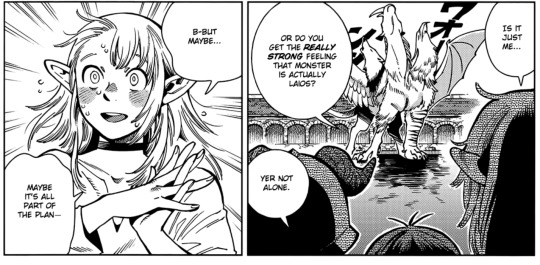
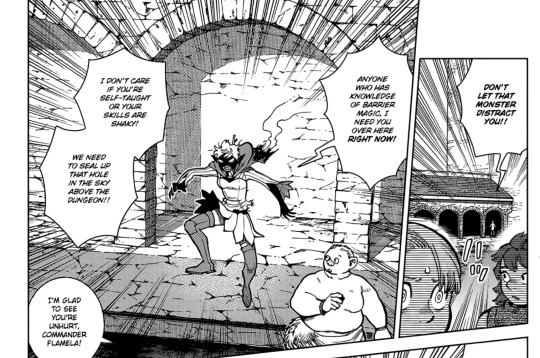
-

-

You'll notice, in all of these instances, there never really is an answer given to the question. Either because there is no way to get one, or, with Kabru at the end there, because he explicitly doesn't let Laios answer. There's even a bit of an arc here: we start with a sort of desperate 'I've mostly given up but maybe this isn't as bad as it looks,' then get a more optimistic 'maybe we really are saved,' and finally end on 'it all worked out in the end, so we maybe don't need to know.'
But, as much as there is some genuine growth in Kabru's 'accept the outcome, rather than dissecting the truth,' I also think it says a lot more about him than about Laios. Kabru is the one trying to handle his questions and his uncertainty - as he said, he wants to confirm his judgement of character. He wants to feel like he had control over things.
And he lets that go! But he also doesn't actually get the truth, either, and his implied assumption here (that Laios, the wide-eyed monster-lover, probably just followed his desires), still relies on his judgements and assumptions about Laios.
But okay, these bits are all focused on the characters theorizing about Laios. How about we look at the character who actually tells us the facts ("facts"): the Winged Lion.
The Winged Lion has quite a bit to say about Laios and his monster form.
He says that Laios hates humanity, and would rather be a monster

I've talked about this a bit already, but the Lion makes a lot of claims and assumptions about Laios that aren't necessarily true.
First of all, let's just make sure we clearly establish that the Lion is being manipulative here. That may seem obvious, but it's important to understand that there is a difference between 'the truth' and 'a version of the truth specifically framed to prey upon your deepest shame and insecurities about what you really want.'
To point out a few quick-and-dirty contradictions here:
If Laios really hated all other humans, then the Lion wouldn't hinge so many of his other arguments on Laios' love for Falin and his friends.
the Lion claims that Laios "[doesn't] even care enough about the future of [the] world to express an opinion about it," even though Laios has literally expressed opinions on what he wants for the world, to the Lion's face.
In general, the Lion does not make a distinction between urges and choices (see, for instance: him using Marcille's subconscious fear of the canaries as a way to keep her from stopping the monsters from attacking in chapter 86).
I'm not saying there is not a piece of truth here, but also... we are not our darkest thoughts, and we especially are not those thoughts as defined by someone who wants to hurt and control us.
But let’s move on to the stuff the Lion claims about Laios once he has been turned into his monster form.
2. He says that (or rather, acts like) Laios is under his control
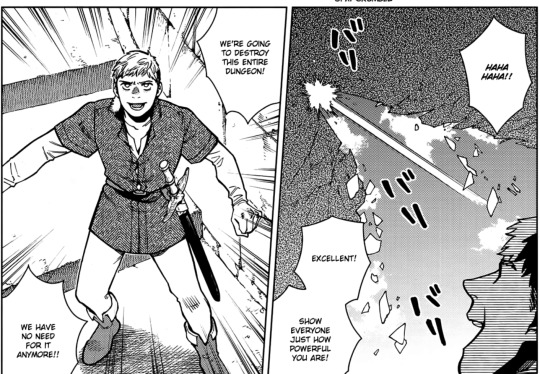
The Lion really enjoys grandstanding about how Monster Laios is an ultimate tool he has control over. He gloats about making Laios fight the others, and has him smash through the magical barrier.
But smashing the barrier is kinda the only thing that Monster Laios actually does for the Lion. He doesn't attack anyone. He doesn't hurt his friends, despite Chilchuck thinking that Laios has "turned completely into a monster." And he certainly doesn't simply let the Lion go through with his plan to eat everyone.
This barrier smashing is actually an interesting and odd thing for Laios to have done specifically, so remember that one. I'll come back to it later.
But, yeah, to the original point... despite the Lion's dramatics, all that Monster Laios does is pose, smash up a magic barrier, and then eat him. Not exactly under his control.
AND SPEAKING OF EATING THE DEMON...
3. He frames Laios attacking and eating him as thoughtlessly violent

This one is pretty funny to me, and the Lion keeps it up for the whole scene. I'm not sure how much of this is his genuine understanding of the situation, and how much is him intentionally framing things in the most insulting manner, but like... truly. The ego involved in this. To see someone who has, multiple times, tried to stand against you - someone who has literally wished for your non-existence, to your face - to see this person attack you, specifically, and have your first reaction be 'huh, I guess he's a reckless weirdo to the core???'
Incredible stuff.
And this part, too:
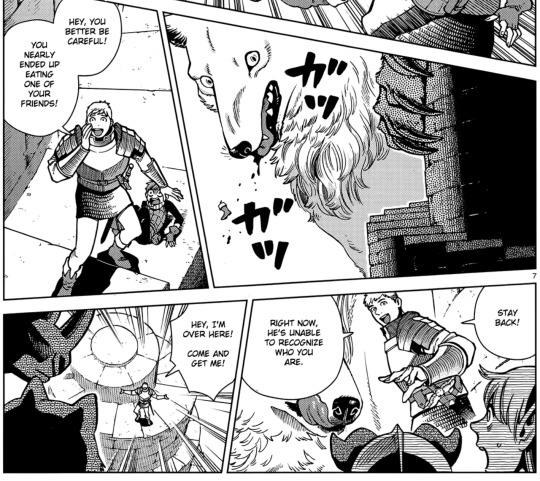
He claims that Laios can't recognize anyone, that he's out of control. And yet, the Lion is the only person that gets eaten here. He is Laios' singular target.
Hell, Laios even specifically attacks one of the bodies that is actively hurting Chilchuck. I don't know if that was entirely intentional on Laios' part, but I do think it's notable.
The Lion torments Laios' friend, and when Laios does something that interrupts that action, the Lion reframes it as unhinged violence. I don't know, there's something here about the way that cruel people only talk about the things people do to resist them as violent, and ignore the violence that causes such resistance in the first place.
In any case, the main point is that the Lion insists on treating Laios like an unthinking animal during this fight, despite the fact that Laios is clearly trying to accomplish something here.
And what exactly is Laios trying to accomplish? Well, the Lion isn't entirely wrong. Laios is trying to eat something. He tells us as much.


And truly, everything Laios does as a monster points to this. He had a goal. And he accomplished it.
Let me back up a moment. I need to explain smashing the barrier.
So, Laios first starts considering how to kill the Lion when he is confronted with the fact that his only other choice would be to kill Marcille. Immediately and entirely discarding that solution, because of course he does, he tries to wrap his head around what defeating the Lion would even look like.

He clearly continues thinking about this, as a nearly identical conversation happens a few chapters later, when Laios is once again told that killing Marcille is the only way forward.
Only, this time, he's started to come up with an idea for how to do this impossible thing.
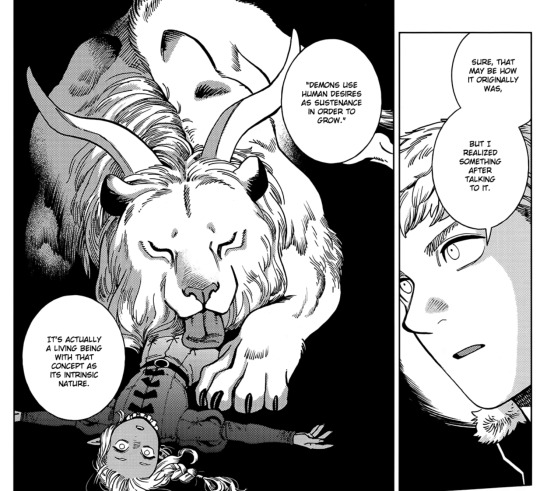
Harkening all the way back to the Living Armor chapter, Laios draws on the same lesson - if the Lion has made itself part of the world, if it has made itself into something alive, that means he can kill it. And eat it.
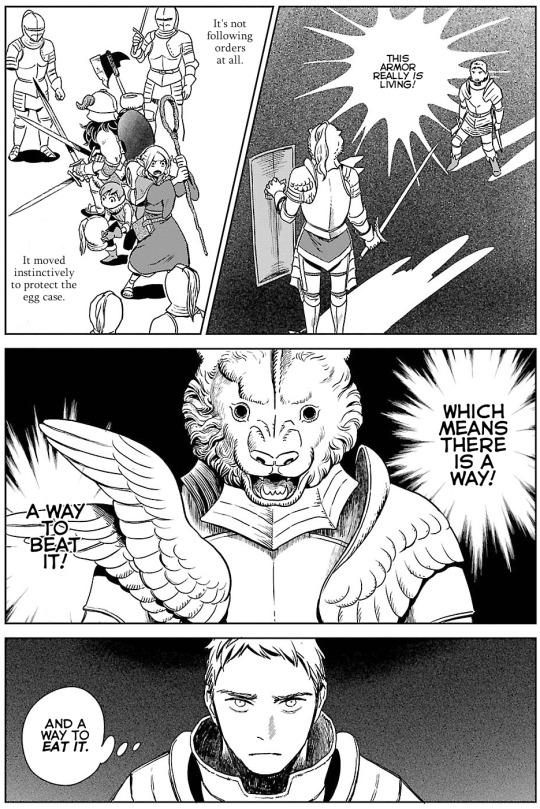
But there's an important extra detail to this. If he's going to try and kill (and eat) the Lion, he needs to strike when it’s vulnerable. He needs to strike when it's eating.
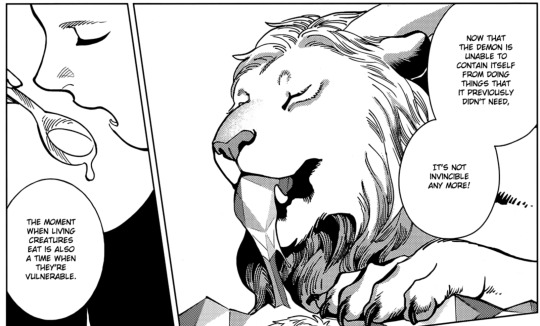
This is why he smashes through the barrier. Again, nothing else he does as a monster really benefits the Lion. He doesn't attack anyone else. The only command he obeys is to smash the barrier. Because the Lion has to think he has won for Laios to be able to eat him.
Beat him. For Laios to be able to beat him.
The question of why Monster Laios wanted to eat the Lion is, I think, the most ambiguous part. Was he curious? Hungry? Did he fight for his own life, for his friends, or for all of humanity? Did he know how to win because he had planned everything from the start, or because he was driven by an unquenchable instinct to do whatever it took to survive?
I don't know that it is possible to say for sure. But I do know that the Lion underestimates Laios, through it all. He underestimates Laios as a human, and he underestimates Laios as a monster.
And in the end, after he is bested, even then I don't think the Lion ever gets Laios. I don't think he understands how much Laios means his words about the Lion being burdened by hunger...
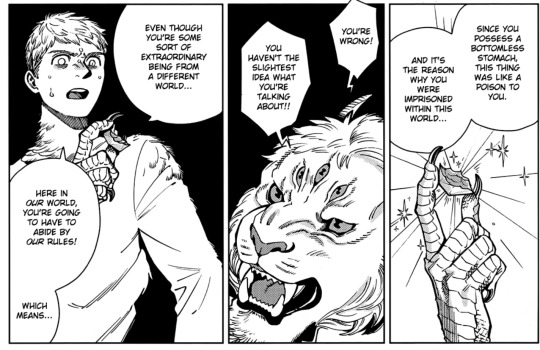

or what Laios cares about most...


or what meaning there is in life, for him.


So I don't buy what the Lion is selling about Laios, generally speaking. I don't buy that Laios didn't ever know what he was doing, and I don't buy that he was nothing more than a hungry beast.
Well. I mean. He was a hungry beast. But he was a more than that too. He was the Devourer of All Things Horrible. And he didn't just happen into that title by chance.
#dungeon meshi#delicious in dungeon#laios touden#winged lion#dissecting how the Lion's negging works is a great exercise in understanding manipulation honestly#dungeon meshi spoilers#dunmeshi analysis
1K notes
·
View notes
Text
"zukos character arc is best-
"no aangs flirting skills are-"
"You forgot sokkas hair-"
YALL FORGOT KORRA
SHE WENT FROM THIS
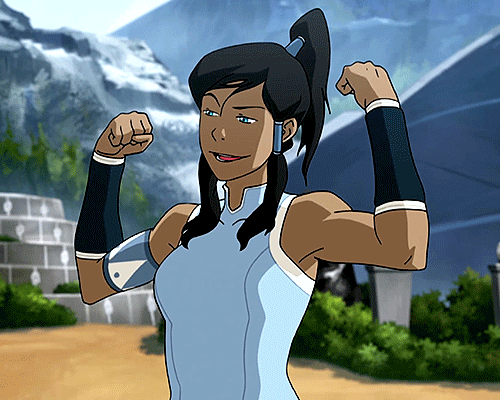
TO THIS

AND STILL GIRLBOSSED HER WYA THROUGH EVERYTHING WHILE ALSO FINDING LOVE AND GAINING BACK THAT MUSCLE!
she also showed a lot of people, like me, that mental health recovery isn't linear. like, girl, that show has problems BUT DAMN IT IF IT ISNT BETTER THAN MoST THINGS YOU SEE
#lok#avatar korra#avatar legend of korra#legend of korra#korra#korra analysis#guys we take advantage of the fact that she comes from an amazing fandom#like she is such a good character#and a great show#and yall trash on it#(im not saying it shouldn’t take criticism)#yall need to chill with the korra hate#you're probably jealous you can pull an asami
464 notes
·
View notes
Text
I keep thinking about Arthur's regression at the end of Season 2 and then into Season 3. I keep thinking about how victims of trauma tend to get worse once they escape their traumatic situation. How their body and mind start to crack and shake under the weight of the horrors, now safe enough to escape the survivorship mindset but now forced to endure the fallout.
I keep thinking of how hard Faroe's death hit Arthur. How his guilt and grief were so intense that he wanted to kill himself, so low that he drank himself into a stupor for who knows how many years to just dull the pain. I keep imagining how hard it was to pull himself out of that, to work with Parker and find a new meaning in life, to walk away from his guilt of killing his daughter, and instead to help people.
(I keep thinking of how Arthur finds a vial of alcohol in the Dreamlands. How he sniffs it and recoils in disgust.)
I keep thinking of how long it took for Arthur to build himself back up from his lowest point, to tuck the guilt of Faroe in the deepest corner of his mind just so that he has enough room to breathe, to live, to be a better person. (And yet, Faroe is every facet of his life. It's his first memory in Season One, when he plays Faroe's Song, when he doesn't even remember his own name. It's the last name on his lips when he dies on that boat. It's his only memory when John is torn away from him.) I keep thinking about how Arthur is consciously repressing her every second of every day just so that he can keep going.
And then John pushes, and asks, and asks again. And finally, after almost dying twice with this entity, after surviving time and time again, he thinks he can trust him. He thinks he can share his deepest secret, to pull open the wound he keeps stitching over to protect himself. How he risks feeling the grief he's suppressed for years to trust someone. I keep thinking how John seizes it and, because he is ancient and young and inexperienced, childlike in his tantrums and his fears of responsibility and consequence, he uses it as a weapon the moment he's backed into a corner. I keep thinking of how not only the trust is torn away from Arthur, but how his wound is stretched and torn, and not only does his guilt and grief come back, but it's like a tidal wave that he cannot suppress this time. He's opened that wound and John has pried it wider, and now Arthur can't shut it. He survives in those pits, but she is all he thinks of. He escapes those pits, and ("Goodbye, Faroe.") she is all he thinks of. He slits his throat and she's all he thinks of.
He enters at icy cabin (a small gurgle, a bundle of blankets in his arm, a warm hum rumbling in his chest as he lulls his whole World to sleep) and he thinks of her to keep going.
And then Yellow enters, a blank slate, a John before he was John, and the pain is too fresh. This is the thing that tortured him. This is the thing that starved him. This is the thing who asked who his daughter was, and when he told him, the thing called him a killer. John and Yellow and the King are all the same in that moment, and Arthur's too fucked up and traumatized to separate them tangibly, as much as he insists that he can. His hatred grows and grows, all from himself, until it bleeds into Yellow, and he remakes this entity in his image, in his self-pitying hatred.
So when Yellow finally calls him a monster (and Arthur knows, he's called himself that the moment he saw the water spill from the bathtub onto the tile below), Arthur holds it close to his chest, and becomes it.
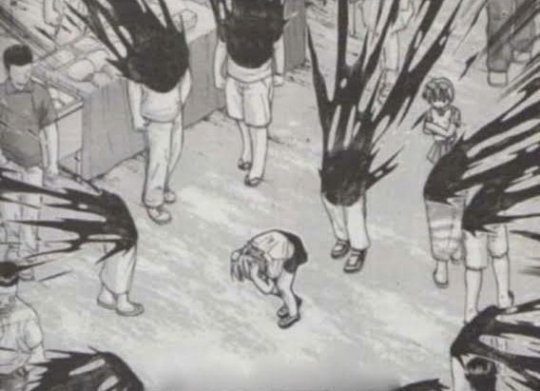
#fuck twitter's limited character amount#so i came here#season three has actually fucked me up#i genuinely thought season three would be my least favorite season when I first listened to it because I was still grieving over john#and then it became my favorite#it's such a great look into ptsd#malevolent#spiteful musings#meta analysis#malevolent podcast#arthur lester#john doe#malevolent john
517 notes
·
View notes